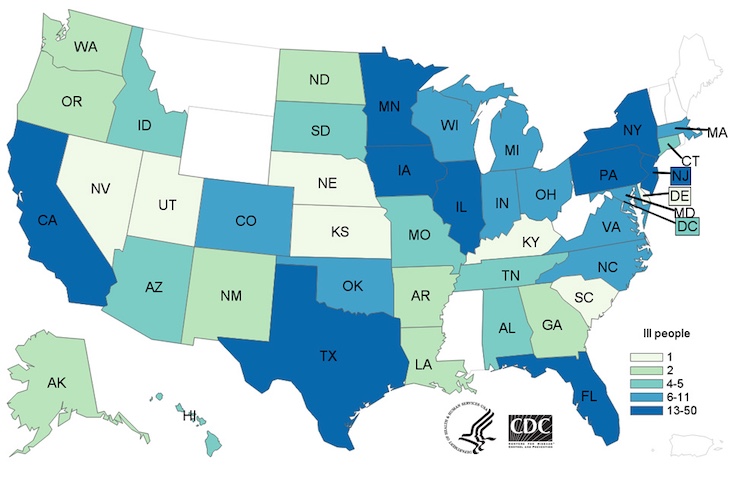The Centers for Disease Control and Prevention (CDC) has issued the final update of the raw turkey Salmonella Reading outbreak. At least 358 people in 42 states have been sickened. More than 130 people were hospitalized in this outbreak, and one death was reported.

The government says that the outbreak strain of Salmonella Reading is present in live turkeys and in many types of raw turkey products. The number of reported new illnesses is decreasing, but people could continue to get sick. The last reported illness was on March 31, 2019.
The case count by state is: Alabama (4), Alaska (2), Arizona (5), Arkansas (2), California (30), Colorado (7), Connecticut (5), Delaware (1), District of Columbia (5), Florida (13), Georgia (2), Hawaii (4), Idaho (4), Iowa (50), Illinois (25), Indiana (8), Kansas (1), Kentucky (1), Louisiana (2), Maryland (8), Massachusetts (8), Michigan (10), Minnesota (21), Missouri (4), Nebraska (1), Nevada (1), New Jersey (13), New Mexico (2), New York (23), North Carolina (10), North Dakota (2), Ohio (8), Oklahoma (6), Oregon (2), Pennsylvania (14), South Carolina (1), South Dakota (4) Tennessee (4), Texas (23), Utah (1), Virginia (11), Washington (2), and Wisconsin (8). Illness onset dates range from November 20, 2017 to March 31, 2019. The patient age range is from less than 1 year got 101.
Of the 302 people who were interviewed in this outbreak, 133, or 44% were hospitalized. That is double the typical number of hospitalizations in a Salmonella outbreak, which is 20%. Some of the Salmonella isolates in this outbreak were resistant to ampicillin (52% of all 487 isolates), streptomycin (32%), sulfamethoxazole (31%), tetracycline (32%), kanamycin (3.4%), gentamicin (0.6%), nalidixic acid (0.4%), ciprofloxacin (0.4%), trimethoprim-sulfamethoxazole (0.4%), and fosfomycin (0.2%).
Of the 200 ill persons interviewed by public health officials, 65% said they prepared or ate turkey products that were purchased raw, including ground turkey, turkey pieces, and whole turkeys. Many different brands off raw turkey products were purchased from many different stores. Four of the 200 interviewees got sick after pets in their home at raw ground turkey pet food.

Attorney Fred Pritzker, who has represented clients sickened with Salmonella infections, said, “Even when you recover from this infection, there is still a risk you will develop a serious complication in the future.” Call 1-888-377-8900 or 612-338-0202 for help.
Food safety attorney Fred Pritzker, who has represented many clients sickened with Salmonella infections in lawsuits against stores and food processors, said, “We hope that the turkey industry makes an effort to control this contamination in their product. No one should get sick because they decided to make turkey burgers for lunch.”
There were several recalls issued in connection with this outbreak. Jennie-O recalled some of their ground turkey products in November and December 2018. Raws for Paws recalled raw turkey pet food in February 2018, and Woody’s Pet Food Deli recalled raw turkey pet food in January 2019.
Investigators found the outbreak strain of Salmonella Reading in samples from raw turkey products from 24 slaughter and 14 processing establishments.
In other words, when you buy raw turkey products, handle them carefully. Try to avoid cross-contamination between raw turkey products and kitchen surfaces, as well as foods that are eaten uncooked. Always cook all turkey products to 165°F, as tested with a food thermometer. And wash your hands well with soap and water after handling raw turkey.
Symptoms of a Salmonella infection include a fever, stomach cramps, nausea, vomiting, and diarrhea that may be bloody. If you have been ill with these symptoms, especially if you have purchased raw turkey products recently, see your doctor.




